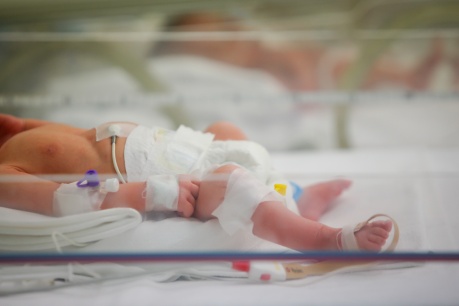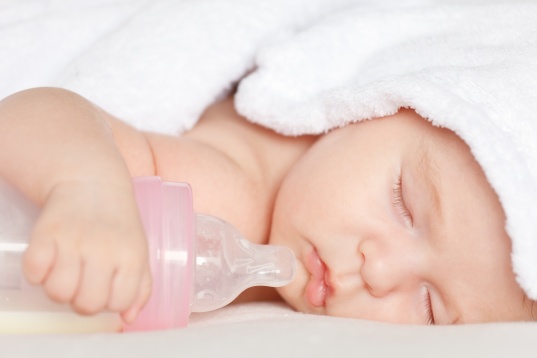As part of their “baby-friendly” initiatives, some hospitals now require women to sign consent forms before receiving formula. These forms purport to list the “harms” associated with “a single bottle” of formula, and ask that parents signify their understanding that formula should not be given unless medically necessary.
On its face, asking parents to sign a waiver to receive formula, a long-used and widely available way of feeding babies, seems astoundingly paternalistic. But what I find most shocking are the allegedly “scientific” claims these forms make about supplementing with formula.
Let’s consider one of these consent forms recently posted by the Fed is Best Foundation.

1. “Exclusively breastfed babies have a lower risk of jaundice.”

Not only is this statement false; the opposite is true.
Exclusive breastfeeding is widely acknowledged to raise the risk of neonatal jaundice, for well-understood physiological reasons.
Jaundice, typically indicated by the yellowing of the skin and the whites of the eyes, is caused by a buildup of bilirubin. When red blood cells break down, they release bilirubin.
For most of us, the liver breaks down bilirubin before it accumulates. This is why jaundice often indicates liver damage.
For newborns, however, whose livers are immature, bilirubin can build up quickly after birth; up to two-thirds of newborns experience mild jaundice. To help out their livers, newborns excrete some of the excess bilirubin in their pee and poop (hence the staining yellow poops!).
While most newborn jaundice is mild and not harmful. Severe jaundice can cause seizures and permanent brain damage.
Fortunately, with proper diagnosis and treatment (typically phototherapy), severe jaundice is exceedingly rare.
So why are exclusively breastfed newborns at higher risk of jaundice? Because, as these babies wait for mom’s milk to come in, they tend to have greater weight loss and less fluid intake than formula fed or supplemented babies during their first few days of life. This translates to less peeing and pooping of the excess bilirubin.
For example, late preterm infants (born between 35 and 37 weeks gestation) have a higher risk of jaundice than full term babies, and their risk is twice as high if exclusively breastfed.
Rating: PANTS ON FIRE
2. “A single dose of formula before 6 months of age can trigger allergies that might otherwise have been avoided.”
I do not know how to describe this claim other than as baseless fearmongering.
The current research consensus is that in high income, developed countries like the United States, breastfeeding does not appear to protect against allergies and asthma. The PROBIT trial, the only large (17,000 mother-infant pairs) randomized trial of breastfeeding conducted to date and thus our most reliable source of information on the true benefits of breastfeeding, reports no impact on allergies.
Furthermore, I cannot locate any plausible source the “single dose of formula” claim. Exactly zero studies appear to examined the effects of a single exposure to formula.
RATING: FALSE; BELIED BY MOST AVAILABLE EVIDENCE
3. “A single dose of formula… increases the risk of diabetes.”
 Again, no one has study the effects of a single dose of formula.
Again, no one has study the effects of a single dose of formula.
But putting the “single dose” nonsense aside, does formula feeding more generally raise the risk of diabetes?
Let’s start by noting that there are two kinds of diabetes, Type 1 and Type 2 Diabetes. Type 1 is an autoimmune disease that most commonly occurs in childhood and adolescence and is caused by an immune-mediated destruction of the body’s insulin producing cells. In Type 2, the body continues to produce insulin, but the cells become resistant to its effects because of a combination of genetic risk factors, weight, and a sedentary lifestyle.
Since the consent forms to specify which type of diabetes formula feeding causes, I will consider the evidence for both.
For Type 1 Diabetes, although some early studies suggested that breastfeeding was protective, a series of recent large, well-designed studies (like this one, this one, and this one) have shown no benefit.
(These studies do find an increased risk of Type 1 among babies who received fully hydrolyzed formula in their first weeks of life. Conventional and partially hydrolyzed formulas, however, had no impact.)
For Type 2 Diabetes, observational studies find that breastfeeding lowers the risk of obesity and thus Type 2 Diabetes. But sibling cohorts and cross-cultural studies, which avoid the problems of confounding that plague observational studies of breastfeeding, find no benefits.
RATING: FALSE; BELIED BY THE BEST AVAILABLE EVIDENCE
4. “A single dose of formula can cause colitis.”

Sadly, this super-precise science based consent form fails to define “colitis”, which makes this statement, like the one on diabetes, difficult to evaluate.
One possible interpretation is that colitis means necrotizing enterocolitis. This interpretation does not make much sense, but a reduction in the risk of necrotizing enterocolitis is at least a real, honest-to-goodness benefit of breastfeeding.
Very premature babies are at high risk of something called necrotizing enterocolitis, a serious and not infrequently fatal disorder involving the intestines. Breast milk lowers the risk of necrotizing enterocolitis.
This interpretation seems like a stretch, though, as necrotizing enterocolitis is essentially unheard of in late preterm and full term babies–whose parents are presumably the targets of this consent form. Parents of very preterm babies would never see such forms, because they typically have an entire care team to with whom to discuss their baby’s feeding.
Or perhaps the author meant allergic colitis. About 3% of newborns will develop colitis (inflammation of their colons) from allergies to certain proteins, most often to milk, but sometimes to eggs or soy. These allergies can be triggered by formula OR by food proteins that have passed into breast milk. There is no evidence that formula increases the chances of this allergic reaction.
Rating: FALSE
5. “Supplementation can cause nipple confusion.”

First off, can we please stop calling this nipple confusing, as that label is just… confusing. It is nipple preference. Babies sometime develop a strong, hard to break preference for either the breast or the bottle.
Regardless of what we call it, babies do not form nipple preferences in their first few days of life. They are too immature. Nipple preference only becomes a potential problem at around 8-10 weeks, when your baby’s brain starts forming associations and they become mentally and physically capable of expressing their preferences.
Rating: MISLEADING
6. “Research shows that breastfeeding…significantly decreases the risk for a large number of acute and chronic diseases that can last a life time.”
Conveniently, this form fails to state which, if any, chronic diseases, breastfeeding permanently protects against–almost certainly because nearly all of such claims about long-term health benefits are based on very low quality evidence, and are not found in high quality studies.
Rating: FALSE
The Bottom Line

Many new moms are at their most vulnerable those first few days after giving birth. Mentally and physically drained by labor and delivery, sleep-deprived, and nervous about their newfound responsibility, their natural inclination is to look to their doctors and nurses for advice and support and to trust in their expertise and experience.
These consent forms violate that trust.
Worse, these forms perpetuate false claims about supplementation and grant them the patina of credibility. This, in my opinion, makes these consent forms not just misleading but dangerously irresponsible. They could lead parent to refuse supplemental formula even when medically indicated, potentially leading to life-threatening starvation, jaundice, and dehydration.
It is time for hospitals to stop this paternalistic and groundless practice. There is nothing “baby-friendly” about it; it is unfounded, coercive, and dangerous.

The answer is not formula supplementation. The answer is having breastmilk readily available for supplementation in hospitals.
I tried to get donor milk for my baby, but the hospital wouldn’t give it to a term baby. I think it would require significant expansion of milk banking to meet the demand for medically necessary supplementation of term babies. (In the USA, the law would need to require insurance companies to pay for medically necessary human milk.)
What about supplementation or replacement that a hospital wouldn’t deem “medically necessary”? What if a baby is being adopted by people unable to produce breast milk? What if a birth parent has trauma or dysphoria related to using their body in that way? What if they don’t produce enough milk, or any at all, or nursing is excruciating for them? I’ve seen many gestational parents truly distressed because they’ve been fed the lie that breast milk is somehow magic, and if they aren’t able to feed their baby exclusively on their own milk they are somehow bad parents. It’s simply not true.
No. Not everyone want to feed their newborn baby a stranger’s body fluid. All actual data (peer-reviewed, not a Facebook meme) shows that formula is an excellent substitute for human milk, not only as “supplementation” but as exclusive food until solids are introduced at 6 months (or later).
As breastmilk is a limited resource, there is unlikely to be enough available to feed babies for whom it isn’t deemed medically necessary. Furthermore, insurance is unlikely to cover donor milk for infants without documented medical need. In the USA, milk from a milk bank costs about $3-5/oz.; ready-to-feed formula prices start at about 24c/oz. If formula is an excellent substitute for mother’s milk as you believe, there should be no reason to feed donor milk to a healthy baby.
Donor milk is screened and pasteurized at milk banks. Using donated milk is like using donated blood or organs. If it weren’t safe, hospitals wouldn’t feed it to delicate premature babies – or to anyone else.
Why is formula supplementation not an answer? The best available evidence shows that the difference in outcomes between breastmilk and formula is so small as to be of little practical importance (except for very pre-term infants). So if formula is not harmful and produces virtually identical outcomes to breastmilk, why isn’t it an answer? Realistically we are unlikely to ever have sufficient breastmilk supplies to be able to supplement all babies that require it. Think of it this way, hospitals often struggle to get enough blood to meet the demands of patients, and most of the adult population are eligible to donate blood. By contrast, only half the population have the potential to be able to donate milk ever, and of that half of the population many will never become pregnant, and of those that do many will never lactate sufficiently to feed their own baby let alone someone else’s, and finally of the women who are able to donate they are only able to do so as long as they’re lactating which may be a total of 6 years of their lives assuming they have more than the average number of children and practise extended breastfeeding. These conditions render it practically impossible to ever have enough donated breastmilk to supplement all the babies who need it. But since we already established that there’s nothing wrong with formula, why would the answer be having more breastmilk available for supplementation in hospitals?
Currently there’s not even enough donated milk to serve all the premature babies who need it. The network of milk banks does not cover all hospitals, either. Formula has to be an alternative for now, and probably for many years to come. In your blood analogy, people who need blood but can’t get it have to die. But babies who can’t get breastmilk have a substitute. Is it as good as the real thing? I doubt it. Should we encourage more milk banking? Absolutely. However, formula is better than it has ever been and is certainly preferable to starvation.
Donor milk is only for premature babies. Don’t want unregulated donor milk.
That’s a false dilemma. Banked milk is available only for prem babies because currently there’s only enough to feed the most vulnerable. Banked milk has no qualities that make it inherently unsuitable for healthy term babies. As for unregulated donor milk, that could mean anything from milk purchased from a stranger across the country to your sister nursing or expressing for your child. Parents have to assess the risks of strangers’ milk and those of artificial baby milk for themselves. Have I misinterpreted your comment?
That Flier seems to no longer be on the California Health website? The original article you quote was dated July 17, 2017 and the CA Heath Website was redone October 2017 and I couldn’t find such malicious lies. As a breastfeeding mother I’m appalled by the lies and shaming in this document. If it is still there I would very much like to reach out to the Department of Health & Complain.
It does seem to have been taken down as part of their migration. I hope that means they are planning to discontinue this practice.
That consent form needs to be revised to include only statements for which evidence can be cited, and references need to accompany each claim. It looks like it was written by someone with very little science background and breastfeeding education. (It wouldn’t be difficult to find peer reviewed studies on the risks of artificial feeding: the AAP statement is full of references.)
I agree. It is also true that the AAP’s statements, while full of references, contains a lot of cherry-picked and outdated information. Many of their health claims for breastfeeding are either not supported by recent meta-analysis and the PROBIT trial, or are highly debated. But you would not know this from the way their statement reads.
What advantage would the AAP, WHO, and similar organizations gain from distorting the truth in this case? There’s no commercial interest pressuring them to come out so strongly in favor of breastfeeding. I’m inclined to trust the AAP and WHO – both their motives and their methods. Is there another body with similar credibility that does not recommend breastfeeding?
I am perhaps naive, but I believe the AAP’s (and others’) overselling of breastfeeding is not about a hidden agenda. It is a good faith effort based on bad science. (For a summary on breastfeeding research, please see my near exhaustive and painstaking summary in this earlier post https://expectingscience.com/2015/11/02/breastfeeding-benefits-the-real-the-imagined-and-the-exaggerated/ ) I suspect it is partly driven by the lens of earlier observational studies which initially suggested the benefits, even in developed countries, were profound and in many cases, life long. (In developing nations breastfeeding is without question lifesaving.) Most of these benefits appear to be due to confounding. It is also probably from the AAP’s desire to be conservative, even if the benefits appear slight, breast milk does have amazing biological properties and we will still cannot conclusively rule out that these have thus far hidden long term benefits.
Thank you very much for your thorough reply to my question below. The blog post you linked to is well researched and written. I do have a few observations. First, it is often unclear what is meant by “breastfed” in a study. (Exclusively breastfed or supplemented? For how long?) That means that studies that find no advantage to breastfeeding might be working with misleading data.
Second, the question shouldn’t be whether breastmilk is better than formula, but whether formula is as good as breastmilk. Breastfeeding is natural; formula is an intervention. It’s the intervention that needs to be proven safe and effective, not the natural function of the body. If only the PROBIT and sibling studies should be considered, then there isn’t enough evidence that formula is as good as breastmilk.
Third, observational studies constitute the bulk of the breastfeeding information we have. They aren’t ideal, but because RCT’s (the gold standard) would be unethical, almost all evidence is (and will continue to be) observational. Formula has not been conclusively proven equal to breastmilk, so breastfeeding should be preferred.
Returning to the context of this discussion, what do our ideas suggest would be the most honest way to write a consent form? I would suggest that it read something like, “Observational studies indicate that…” That communicates the claimed advantages while acknowledging that the evidence may not be rock solid.
Again, thank you very much for your thoughtful writing. This has been a worthwhile discussion and has inspired me to ask new questions.
Something that hasn’t been mentioned is the frustration of parents whose infants have been fed in a way that is contrary to their wishes. I think some kind of consent makes sense. Parents should have their intentions and wishes around the feeding of their infants respected. The only exception would be if formula (or donor milk) is given to the parent and the parent feeds the baby, then consent is implied, but if babies are fed in a nursery and by medical staff the parents should know and consent.
How can we organize to get this form and others like it removed from circulation?
I think one of the best and simplest ways is to support the Fed is Best organization. But let me know if you think of others!